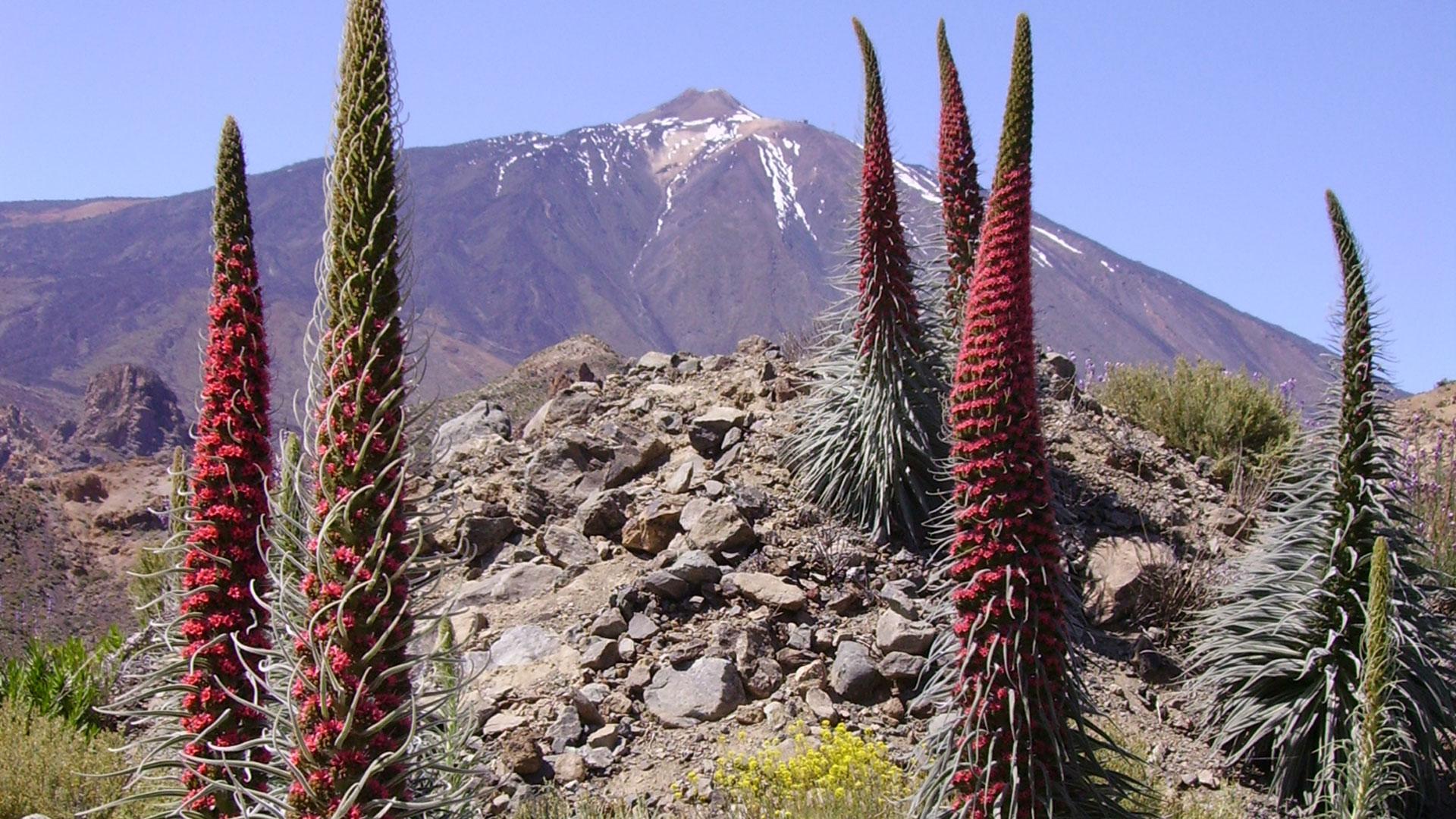The islands of Macaronesia reveal crucial information for ecology, evolution and conservation
Tajinastes ('Echium' sp.) Near Teide (Tenerife) / Ana Margarida Coelho dos Santos (UAM)
An international team of 32 researchers, among them Dr. Miquel Arnedo and his team IRBio's members, specialists in island biodiversity, has managed to synthesize the most important discoveries that have been made to date at the level of ecology, evolution and conservation of Macaronesia, a region located in the Atlantic Ocean that includes the archipelagos of volcanic origin of the Canary Islands, Azores, Madeira, Salvajes and Cape Verde.
The Macaronesian Islands have long fascinated biologists. In fact, many of the scientific advances related to the functioning of island systems are derived from studies carried out in this oceanic region.
However, despite its importance, the information on the ecology, evolution and conservation of these archipelagos has so far been scattered in the literature, so a synthesis work was urgent. The results, published in the journal Frontiers in Ecology and Evolution , present a complete review of the available literature.
"We have managed to compile the most important advances that have been made in the biology of the islands of Macaronesia, both in terms of terrestrial biodiversity and marine biodiversity," say Margarita Florencio and Ana MC Santos, study directors and professors. of the Department of Ecology of the Autonomous University of Madrid (UAM).
Origin and biological dispersion
Some studies indicate that an important part of the animal and plant organisms that inhabit Macaronesia originated recently (they are quite young at an evolutionary level), predominantly of European origin, and that they do not descend from ancient lineages that used these islands as a refuge.
Furthermore, other studies indicate that Macaronesia appears to be the point of origin for the colonization of the continents on both sides of the Atlantic. The dispersal of organisms between the islands, and of these with the mainland, implies that the species have to travel very long distances (in some islands even more than 1,500 km).
In fact, on these islands, examples of poorly known dispersal mechanisms have been found, such as seeds that have been ingested by different birds and frugivorous reptiles, which in turn are eaten by predatory birds (secondary dispersal), which then they transport these seeds over great distances.
Other interesting interactions are those carried out by different species of reptiles and birds, which act as pollinators and dispersers of seeds of different plants, or of a species of giant gecko from Cape Verde, which feeds on birds, all unusual behaviors in the areas continental.
Unique biodiversity threatened
The work presents an updated comparison of the number of endemic species of animals and plants that exist in each archipelago, that is, that only appear in some of these archipelagos, in some cases even in a single island.
This unique biodiversity, the result of different diversification processes, is largely threatened by the presence of species introduced (accidentally or not) by humans, which can easily invade island systems.
“Introduced species, together with changes in land use, constitute two great threats to this biodiversity. It is of the utmost importance that the efforts made to date to obtain biodiversity data continue in an intense way in the short and long term in order to gain an in-depth understanding of the island ecosystems, as well as the unique species that inhabit them ”, highlight the directors of the work.
"In this way," they add, "we will be able to rigorously assess the threats to which they are subjected, and draw up conservation plans to safeguard them."
As the researchers also explain, the actions that have been carried out in some of the archipelagos at the level of awareness and decision-making for conservation have been essential, and which have implicated politicians, scientists and citizens. "For this reason we consider it an example in which other regions can be set to favor the conservation of biodiversity."
"In addition," they conclude, "in the work we have also identified possible future studies and applications that may be carried out in Macaronesia to contribute significantly to the advancement of knowledge of island biology."
The work is the result of a collaboration of the Island Biology Interest Group-IBIG of the Spanish Association of Terrestrial Ecology. The authors dedicate it to the co-author Ana I. Neto, who died during its development.
_____________________
Bibliographic reference:
Florencio, M., Patiño, J., Nogué, S., Traveset, A., Borges, PAV, Schaefer, H., Amorim, IR, Arnedo, M., Ávila, SP, Cardoso, P., de Nascimento, L., Fernández-Palacios, JM, Gabriel, SI, Gil, A., Gonçalves, V., Haroun, R., Illera, JC, López-Darias, M., Martínez, A., Martins, GM, Neto, AI, Nogales, M., Oromí, P., Rando, JC, Raposeiro, PM, Rigal, F., Romeiras, MM, Silva, L., Valido, A., Vanderpoorten, A., Vasconcelos, R., Santos , AMC 2021. Macaronesia as a Fruitful Arena for Ecology, Evolution, and Conservation Biology . Frontiers in Ecology and Evolution 9: 718169. doi: 10.3389 / fevo.2021.718169
Source:UCCUAM
